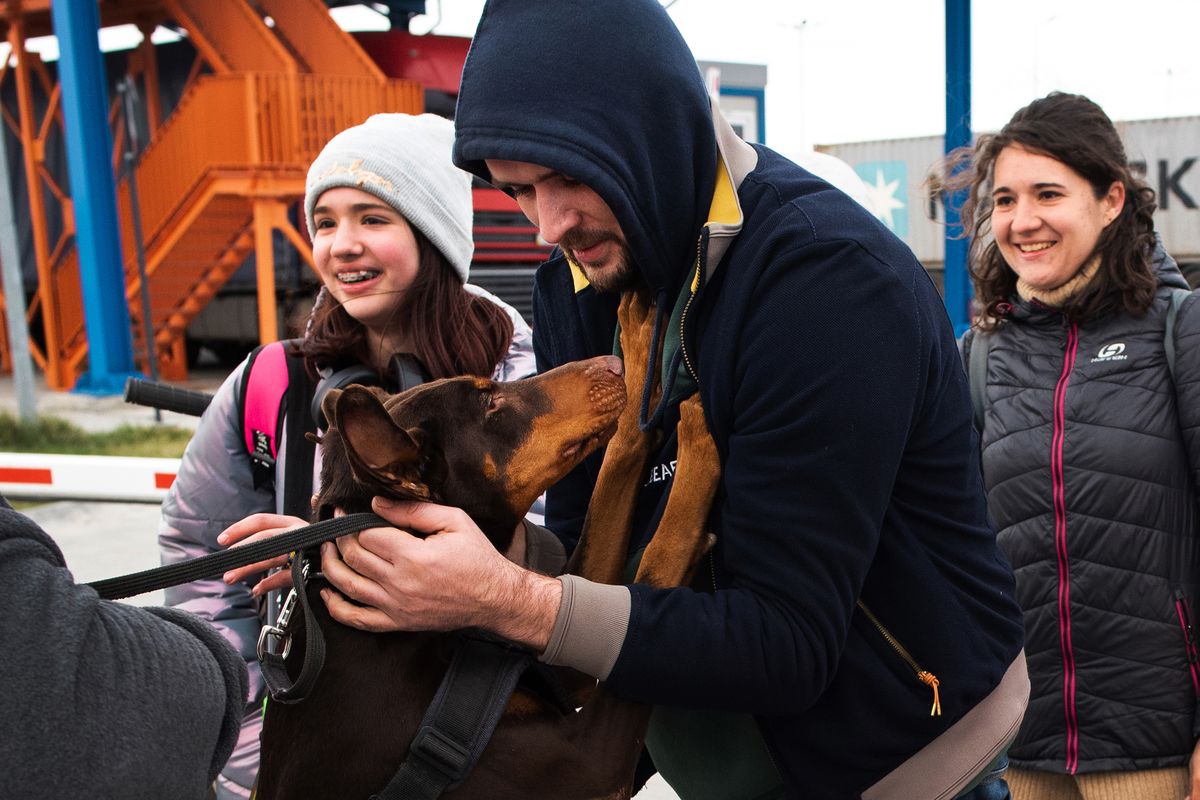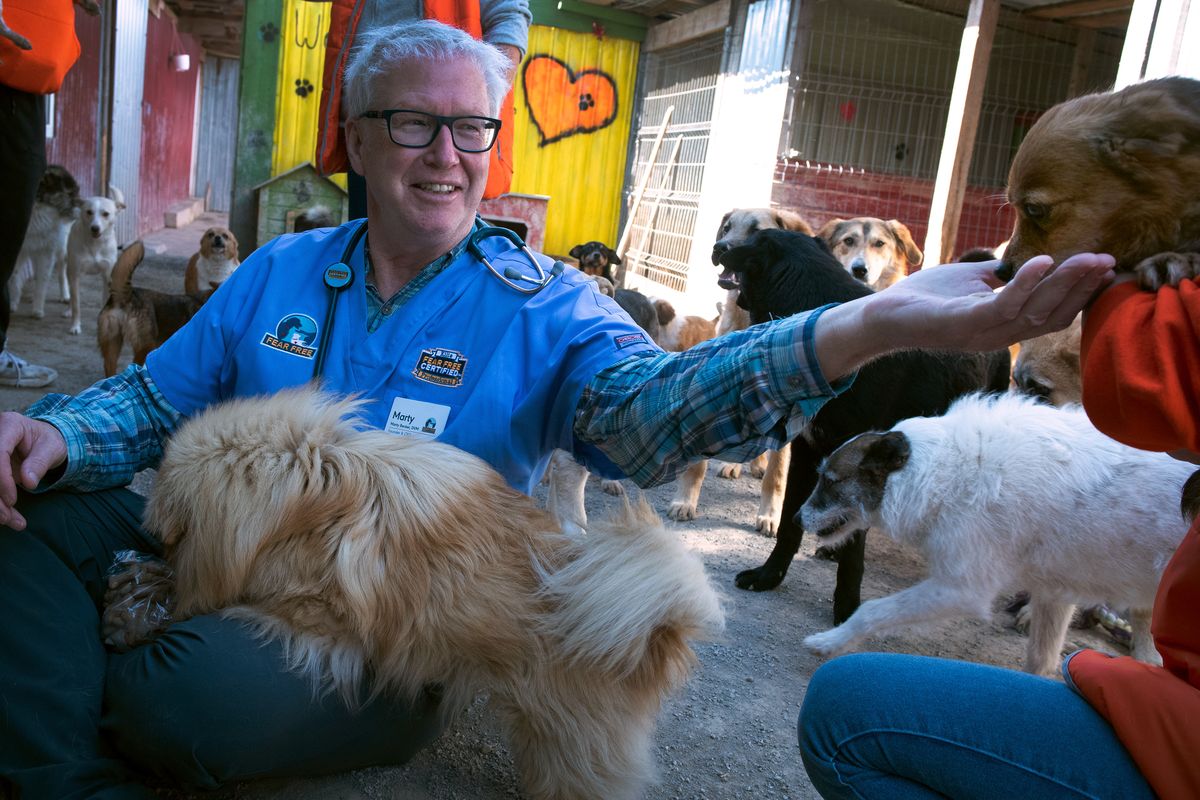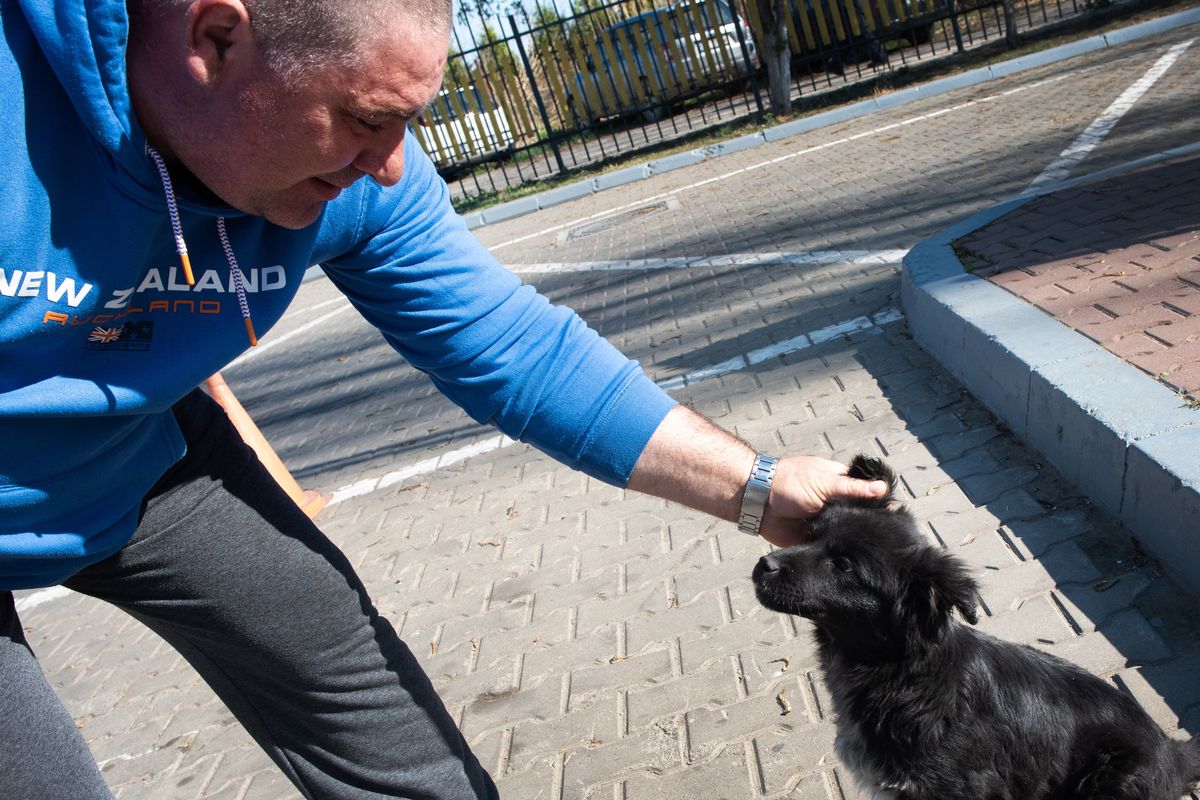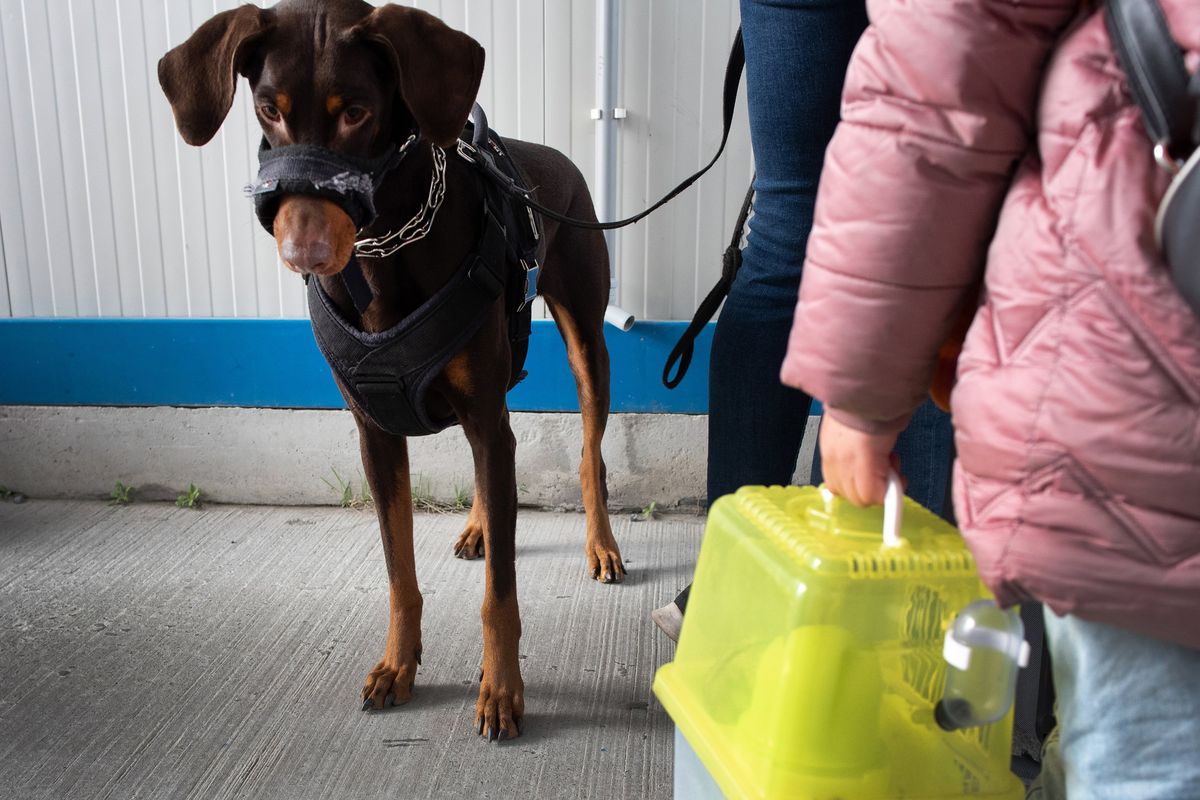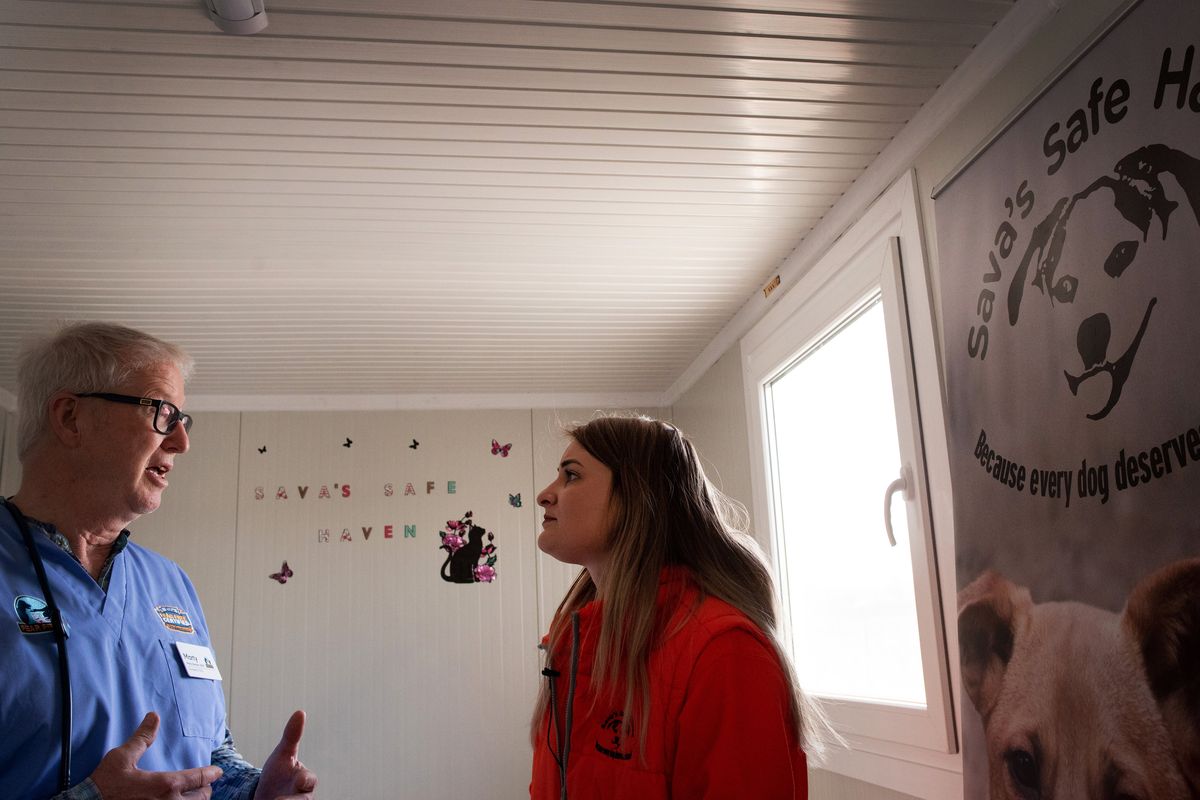Veterinarians from Romania to Bonners Ferry flock to Ukrainian border for passion that transcends war: the love of pets
Greicy the dog leaps up to greet Vladyslav Oleksandra on Thursday at the Ukrainian-Romanian border. Yershova Oleksandra, right, and her two daughters fled their home in Kherson, Ukraine, two days prior. They brought with them Greicy, their cat, Busya, and their hamster, Homa. Vladyslav had been working in Poland when the war broke out. (Eli Francovich/The Spokesman-Review)Buy a print of this photo
ISACCEA, Romania – With a tug and a jerk, Greicy, a lanky and muzzled Doberman who’d spent the past two days fleeing the war in Ukraine, was free and running.
She bounded across the pavement of a small border crossing in eastern Romania Thursday, dodging confused volunteers, the wind whistling freedom, and leapt into the waiting arms of Vladyslav Oleksandra.
Behind the Doberman trailed Yershova Oleksandra and her two children. They’d spent the past two days traveling from Kherson, Ukraine, an important port city and one of the first to be occupied by Russian soldiers. With them, they brought Greicy, the Doberman, their family cat, Busya, and a hamster, Homa. Vladyslav – her husband – had been living in Poland when the war started. As they embraced, Greicy stood on her hind legs to join in the hug and Yershova cried.
“Very scary,” she said of the trip out of Ukraine. “But we got a lot of help from people.”
That help was not limited to her and her children. At the small border crossing in Romania, several veterinarians and other animal lovers waited to help Ukrainian pets fleeing the war.
Veterinarians and volunteers all along the Ukrainian border are helping pets get vaccinated, checking up on ailments, implanting microchips and ensuring the animals have the paperwork necessary to travel.
Jesse Tinsley - The Spokesman-Review
Among them Thursday was Dr. Marty Becker, a veterinarian who lives in Bonners Ferry. Becker has written several books and appeared on “Good Morning America” for 17 years. Known as “America’s Veterinarian” from his time on that show, Becker arrived in Romania on Tuesday to help raise awareness and money for the ongoing crisis and its impact on pets. More than 4 million people have fled Ukraine in the past month, with another 6.5 million internally displaced. Many of them brought pets, although the exact number isn’t known.
Those pets and the care they need, Becker argues, are not luxuries.
“Uncertainty is so stressful for people,” he said, rattling off a list of questions the average refugee must consider.
Where will I live? What will I eat? Will my kids go to school? Will I ever go home? Is my home even there still?
Amidst that swirl of chance, a pet can be a thread of stability.
“One thing is as certain as death and taxes, and that’s the unconditional love of a pet,” Becker said. “Rich. Poor. Black or white. They love you for who you are, and it never changes.”
Why pets?
With all the human suffering in Ukraine, focusing on animal welfare could seem a waste of resources and time. Becker disagrees, pointing first to the mental health benefits of pets and, second, to the cascading impact veterinarians can have.
“If I help a pet, I’m also helping people,” he said. “I’m also helping the whole family.”
Research has shown pets provide a raft of physical benefits. One example: A March 9 study at a Canadian hospital found that after a 10-minute visit from a therapy dog, patients reported “significant” reductions in pain, anxiety and depression. Other studies show that petting a cat reduces stress and improves mood. Dog ownership has been associated with a 24% reduction in risk of all types of death and a 31% reduction of risk of death by heart attack or stroke, according to a 2019 study conducted by the American Heart Association.
Those values are only amplified during times of war.
“It’s something that gives them hope,” said Jesse Adams, a volunteer from Vancouver Island, B.C., who was on the border Thursday and has worked with pets in other conflict zones.
Adams has been there for two weeks. Just days prior, he met a woman who fled from Kyiv with her husband and her dog. Her husband had lost his hand in an agricultural accident and was thus exempt from the Ukrainian military’s conscription laws. But while traveling to the border, he was killed during a mortar attack.
“That’s all she had left,” David Manobla, a veterinarian from Fort Collins, Colorado, said of the woman’s pet.
‘All dogs deserve a chance’
About 30 miles from the border, near the town of Galaţi, Romania, a handful of portable buildings sit on a rectangular plot wedged between wheat fields. A gate and four ferocious-looking German shepherds keep unwanted visitors out. The 23,000-square-foot complex is the unlikely looking home of 300 dogs and about 20 cats.
For 10 years, Alexandra Sava and her family have run Sava’s Safe Haven. Sava, 24, started the shelter when she was 14, after her beloved family dog died of parvo, a virus that’s easily treated in the U.S., but more common in Romania where there are many street dogs and not enough antiviral medications.
Her father, a truck driver with the body of a boxer and the demeanor of Francis of Assisi, shared her love of animals and started building the shelter in 2011. Since then, they’ve taken in dogs and cats. Vaccinated them. Spayed and neutered them. Nursed them back to health and found them homes, mostly in the U.K. and Germany. When necessary, the Sava family gives them a place to live when no one else will.
Some dogs in the shelter have lived there since it opened. Sava, who is a veterinary nurse and works part time at veterinary clinic in Galaţi, knows every animal by name. In the decade the family has run the shelter, 5,000 animals have stayed there.
Since Russia invaded Ukraine, the Savas have taken in 40 dogs from Ukraine. They also volunteer their time at the border, doling out dog food, giving vaccines and helping however they can.
Greicy, a doberman, waits at the border crossing from Ukraine to Romania on April 7, 2022. (Eli Francovich/The Spokesman-Review)Buy a print of this photo
Refugees from Ukraine can keep their animals at the shelter until they get their feet under them, or leave them there forever, Sava said. She’ll help anyone. She recalled one woman, a dog breeder, who brought 12 Jack Russell Terriers to Romania from Ukraine. Some asked why she’d help a breeder, someone who might make money off these animals someday.
The answer was simple: “All dogs deserve a chance,” she said.
Becker toured Sava’s shelter on Thursday before going to the border. He’d heard about her through World Vets, and what he saw impressed him. The dogs ran freely together, didn’t fight and clearly trusted the Sava family.
“I didn’t see a single poop,” he said at one point. “Amazing.”
But it comes at a cost. Sava works part time as a veterinary nurse, making about $570 a month. With the influx of Ukrainian refugees and their pets, her limited time is being stretched even further.
That’s not an uncommon story across eastern Europe. The influx of refugees has stretched social and political services, and while there has been an initial wave of aid and volunteers, local organizers worry about what happens when the international gaze shifts elsewhere.
It’s a similar story when it comes to animals. The European Union has eased entry requirements for Ukrainian pets. Under the loosened rules, pets are required to have a rabies vaccine and a microchip.
Gabriel Varga, the past president of the World Small Animal Veterinary Association, said the long-term impacts of the war on veterinary care, in Ukraine and in Europe broadly, could be profound. Veterinarians in Ukraine have sent him photos of bombed clinics, and there are growing numbers of feral and roving dogs and cats, left behind by owners who fled or died, Varga said. Rebuilding that infrastructure will take years.
Varga said there also may be disease outbreaks, in Ukraine and elsewhere in Europe. He urged those who want to help to donate money to organizations and people who are working on the ground.
Disease is something Alex Maximilian, a veterinarian near Galati, worries about. In particular, he believes the influx of pets could lead to an outbreak of rabies in Romania.
“It is not a rabies-free country,” he said of Ukraine. “They are free to enter Romania and other countries without any filters. That is a problem.”
He still supports refugees being able to bring their pets into Romania and doesn’t want to make their lives any harder. But at the same time, the long-term care of animals remains a real question. Will support, which has been plentiful so far, continue?
“How are we going to manage this situation?” he asked.
‘America’s Vet’
Becker is gregarious, confident and polished from years of television and public speaking, yet comes off as genuine and approachable. Over the course of a few days, he mentions multiple times that he’s been to 86 countries. It sounds not like a brag, but a simple statement of fact, perhaps a sign of humble roots as an Idaho farm boy.
He grew up in Castleford, on a 160-acre family farm growing potatoes, corn, wheat and beans. But his family also had a small dairy herd designed as a buffer from the vagrancies of weather and markets. That exposure to cattle and other animals convinced him at the age of 6 that he wanted to be a dairy veterinarian, and he went to Washington State University in 1976 with that intention.
That didn’t last long.
On Becker’s first day, the dean of the College of Veterinary Medicine, and a pioneer in human-animal bond research, Leo Bustad, gave a talk about his time as prisoner of war in Germany during World War II. While a prisoner, he’d befriended a guard dog, a connection that gave him hope throughout his imprisonment.
“He just moved me with that talk,” Becker said.
Becker’s fate was sealed, and he switched tracks and became a companion animal veterinarian, graduating in 1979. He moved back to southern Idaho to practice.
His first brush with a wider audience came when he wrote “Chicken Soup for the Pet Lover’s Soul” in 1998. The book did well and landed Becker a gig on “Good Morning America”. He continued to practice as a veterinarian in Idaho throughout the 17 years he appeared on the show, although he said his real strength has always been communication.
“I’m a below-average veterinarian,” he said. “The only place I’m really good is in the exam room interacting with pets and people.”
In 2009, he was 55 and ready to retire, but another lecture derailed his plans. While at a veterinary conference in Victoria, B.C., he listened to a talk about fear and animal care.
“Fear is the worst thing a social species can experience, and it causes permanent damage to the brain,” he said, recalling the speaker’s opening lines.
That lecture triggered an idea, and on April 1, 2016, he launched Fear Free, a training program aimed at helping veterinarians interact with pets and other animals in a way that doesn’t terrify the animal. Now, that system – which was designed by leading animal behaviorists – is available in 70 countries. The program is free to volunteers on the Ukraine border and veterinarians living in eastern Europe, Becker said.
At the end of the day, it’s these communicative and fundraising skills that convinced Becker to travel to the border. He did not assess or treat any animals. Instead, he asked people what they needed, met with veterinary students and professionals, and urged the many folks in America who follow him to donate money to those working on the border, including Sava’s Safe Haven.
‘I don’t want to talk about the war’
Once the Ukrainian family was reunited Thursday, they hustled their bags to a waiting van and the pets went to a nearby veterinary medical tent.
There, some veterinarians from the United States gave Greicy, the Doberman, a hot dog while she got a rabies shot. The cat was microchipped, and both had the necessary paperwork filled out by volunteers. From there, the family will head to the Czech Republic, said Yershova Oleksandra, the matriarch.
She doesn’t know what they will do, or exactly where they will live. But she makes one thing clear, while speaking through a translation application.
“I don’t want to talk about war,” she said. “Talking about pets, that’s OK.”
Spokesman-Review reporter Eli Francovich is in Eastern Europe to cover the stories of people with ties to Spokane and those affected by the war. Francovich’s articles will appear throughout the week. His trip was paid for largely by Spokesman-Review readers who have donated to the Community Journalism Fund and through the newspaper’s Northwest Passages event series. To help support this trip and similar newsroom efforts, contributions can be made at www.spokesman.com/thanks.
